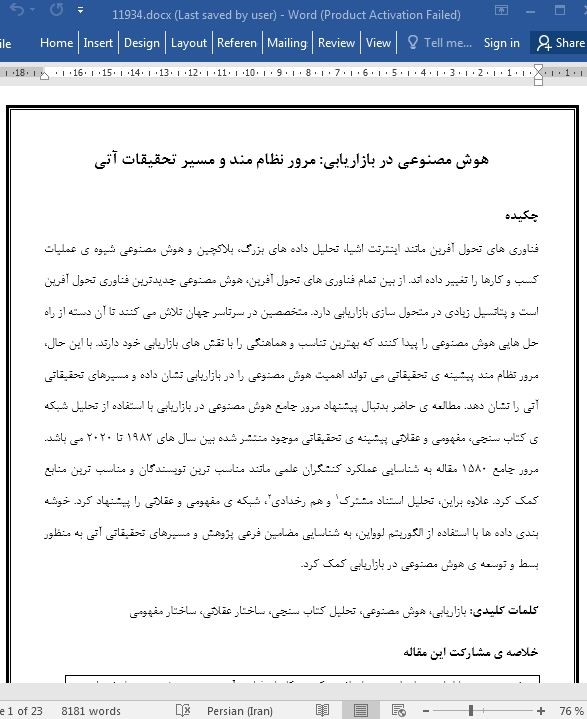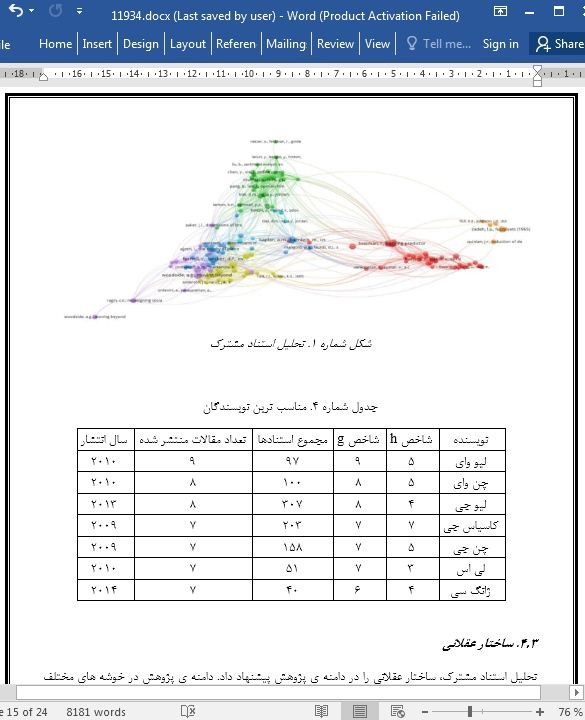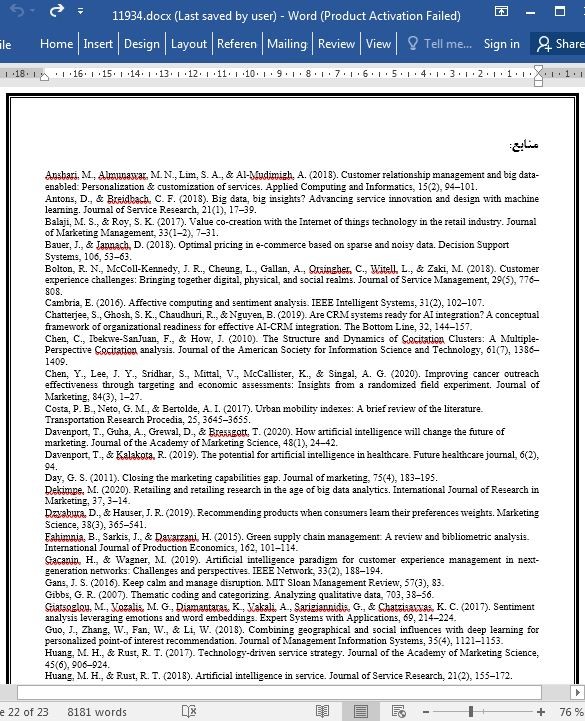
هوش مصنوعی در بازاریابی: مرور نظام مند و مسیر تحقیقات آتی
چکیده
فناوری های تحول آفرین مانند اینترنت اشیا، تحلیل داده های بزرگ، بلاکچین و هوش مصنوعی شیوه ی عملیات کسب و کارها را تغییر داده اند. از بین تمام فناوری های تحول آفرین، هوش مصنوعی جدیدترین فناوری تحول آفرین است و پتانسیل زیادی در متحول سازی بازاریابی دارد. متخصصین در سرتاسر جهان تلاش می کنند تا آن دسته از راه حل هایی هوش مصنوعی را پیدا کنند که بهترین تناسب و هماهنگی را با نقش های بازاریابی خود دارند. با این حال، مرور نظام مند پیشینه ی تحقیقاتی می تواند اهمیت هوش مصنوعی را در بازاریابی نشان داده و مسیرهای تحقیقاتی آتی را نشان دهد. مطالعه ی حاضر بدنبال پیشنهاد مرور جامع هوش مصنوعی در بازاریابی با استفاده از تحلیل شبکه ی کتاب سنجی، مفهومی و عقلانی پیشینه ی تحقیقاتی موجود منتشر شده بین سال های 1982 تا 2020 می باشد. مرور جامع 1580 مقاله به شناسایی عملکرد کنشگران علمی مانند مناسب ترین نویسندگان و مناسب ترین منابع کمک کرد. علاوه براین، تحلیل استناد مشترک و هم رخدادی ، شبکه ی مفهومی و عقلانی را پیشنهاد کرد. خوشه بندی داده ها با استفاده از الگوریتم لوواین، به شناسایی مضامین فرعی پژوهش و مسیرهای تحقیقاتی آتی به منظور بسط و توسعه ی هوش مصنوعی در بازاریابی کمک کرد.
1. مقدمه
فناوری های تحول آفرین مانند هوش مصنوعی، اینترنت اشیا، تحلیل داده های بزرگ، راه حل های دیجیتال را برای جذب و حفظ پایگاه مشتری پیشنهاد کرده اند (آنشاری، المنور، لیم و ال مودیمیق 2018، بولتن و همکاران 2018). فناوری های نوظهور، مزیت رقابتی را ارائه می کنند (روحانی و همکاران 2016، اسپرینگ و همکاران) و این کار را با تسهیل ارائه ی محصول و خدمات پیشنهادی به مشتریان انجام می دهند (بالاجی و روی 2017، خاناگا و همکاران 2017، لیائو 2015). در سناریوی کسب و کار فعلی، رقابت تنگاتنگ و فناوری های تحول آفرین، نحوه ی فعالیت سازمان ها را تغییر داده اند (گانز 2016). رویکرد مشتری محور جهانی که بر نیازهای مشتری تمرکز می کند، نقشی حیاتی در رشد سازمانی ایفا می کند (وترلی، اوبرنیکل، برنر، پتری و استرمان 2016). هوش مصنوعی یک فناوری نوظهور رایج است که به سازمان ها کمک می کند تا داده ها را برای تحلیل و پاسخ سریع به نیازهای مشتری در زمان واقعی ردیابی کنند (ویرث 2018). هوش مصنوعی رهیافتی درخصوص رفتار مصرف کننده که برای جذب مشتری و حفظ مشتری لازم است، پیشنهاد می کند. هوش مصنوعی حرکت بعدی مشتری را برمی انگیزد و تجربه ی کلی را مجدداً تعریف می کند (تجپکما 2019). ابزارهای هوش مصنوعی برای استنتاج انتظارات مشتری و ناوبری مسیر آتی سودمند هستند (شبیر 2015).
Abstract
Disruptive technologies such as the internet of things, big data analytics, blockchain, and artificial intelligence have changed the ways businesses operate. Of all the disruptive technologies, artificial intelligence (AI) is the latest technological disruptor and holds immense marketing transformation potential. Practitioners worldwide are trying to figure out the best fit AI solutions for their marketing functions. However, a systematic literature review can highlight the importance of artificial intelligence (AI) in marketing and chart future research directions. The present study aims to offer a comprehensive review of AI in marketing using bibliometric, conceptual and intellectual network analysis of extant literature published between 1982 and 2020. A comprehensive review of one thousand five hundred and eighty papers helped to identify the scientific actors' performance like most relevant authors and most relevant sources. Furthermore, co-citation and co-occurrence analysis offered the conceptual and intellectual network. Data clustering using the Louvain algorithm helped identify research sub-themes and future research directions to expand AI in marketing.
1. Introduction
Technological disruptions such as artificial intelligence (AI), internet of things (IoT), big data analytics (BDA) have offered digital solutions for attracting and maintaining the customer base (Anshari, Almunawar, Lim, & Al-Mudimigh, 2018; Bolton et al., 2018). Emerging technologies provide a competitive advantage (Rouhani et al., 2016; Spring et al., 2017) by facilitating the customers’ product and service offerings (Balaji & Roy, 2017; Khanagha et al., 2017; Liao, 2015). In the current business scenario, the cut-throat competition and technological disruptions have changed the way organizations operate (Gans, 2016). Globally customer-centric approach focused on customer needs plays a pivotal role in organizational growth (Vetterli, Uebernickel, Brenner, Petrie, & Stermann, 2016). Artificial intelligence (AI) is a widely used emerging technology that helps organizations track real-time data to analyze and respond swiftly to customer requirements (Wirth, 2018). AI offers consumer insight on consumer behavior essential for customer attraction and customer retention. AI incites the customer’s next move and redefines the overall experience (Tjepkema, 2019). AI tools are useful to deduce customer expectations and navigate the future path (Shabbir, 2015).
چکیده
1. مقدمه
2. مرور پیشینه تحقیقاتی
2.1. مزیت یادگیری ماشین بر فناوری های دیگر
2.2. اصل زمینه ای هوش مصنوعی
2.3. استفاده از هوش مصنوعی در بازاریابی
3. روش پژوهش
3.1. انتخاب پایگاه های داده کتاب سنجی
3.2. تعریف کلمات کلیدی (راهبرد جستجو)
3.3. تصحیح نتایج اولیه (معیارها ورود و خروج)
3.4. طرح تحلیل داده ها
3.5. شناسایی خلأهای پژوهشی و مسیرهای تحقیقاتی آتی
4. یافته ها
4.1. آمار توصیفی جمع آوری کتاب سنجی
4.2. عملکرد کنشگران علمی
4.3. ساختار عقلانی
4.4. موضوعات متداول
4.5. مسیرهای تحقیقاتی آتی
5. نتیجه گیری
منابع
Abstract
Keywords
1. Introduction
2. Literature review
2.1. Advantage of machine learning over other technologies
2.2. Principle behind working of artificial intelligence
2.3. Use of artificial intelligence in marketing
3. Methodology
3.1. Selection of bibliometric databases
3.2. Defining keywords (search strategy)
3.3. Refining the initial results (Inclusion and exclusion criteria)
3.4. Data analysis plan
3.5. Identification of research gaps and future research directions
4. Findings
4.1. Descriptive statistics of bibliographic collection
4.2. Performance of scientific actors
4.3. Intellectual structure
4.4. Trending topics
4.5. Future research directions
5. Conclusion
References
- اصل مقاله انگلیسی با فرمت ورد (word) با قابلیت ویرایش
- ترجمه فارسی مقاله با فرمت ورد (word) با قابلیت ویرایش، بدون آرم سایت ای ترجمه
- ترجمه فارسی مقاله با فرمت pdf، بدون آرم سایت ای ترجمه



